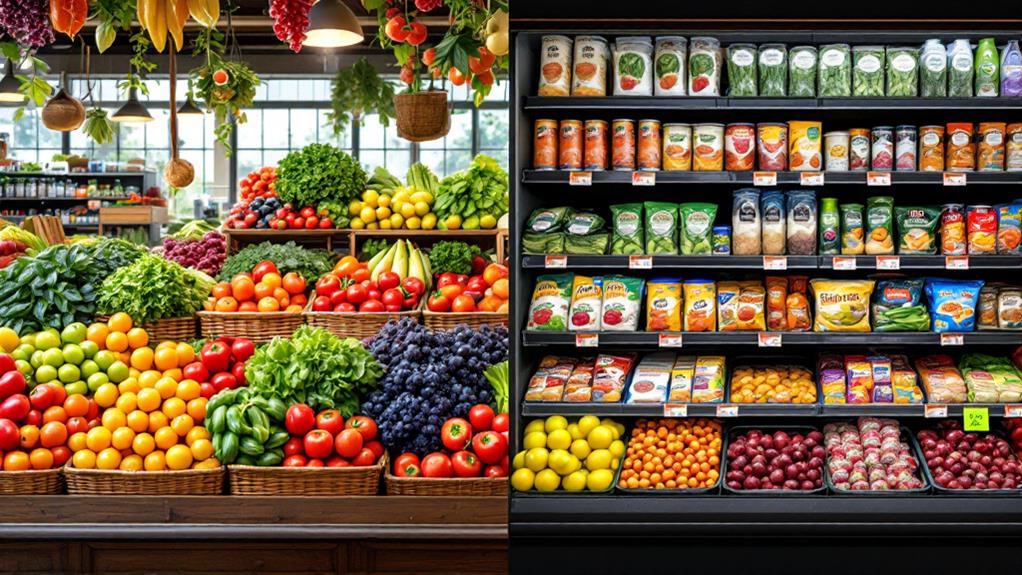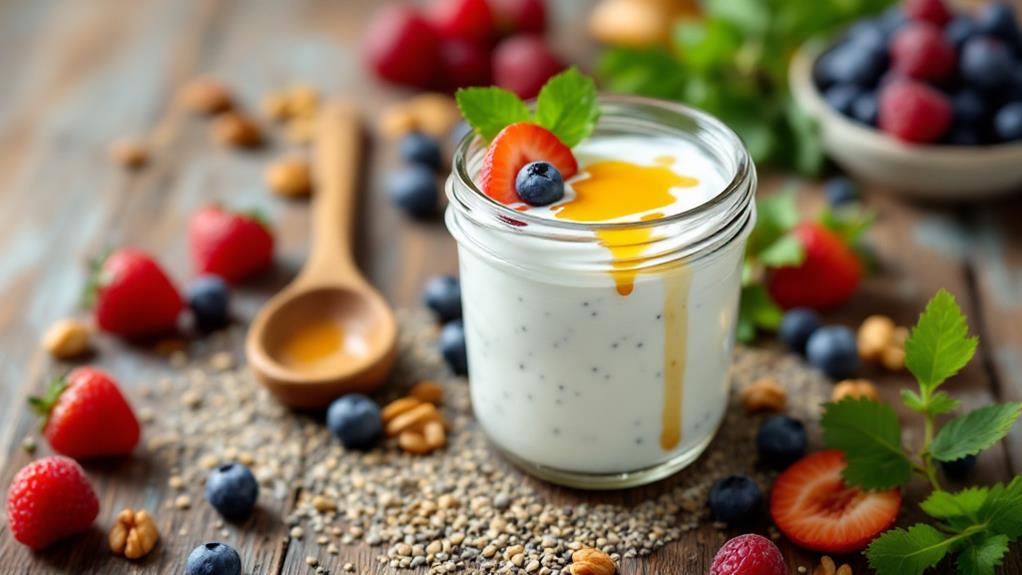How Olive Oil Promotes Weight Loss: A Healthy Fat for Your Diet
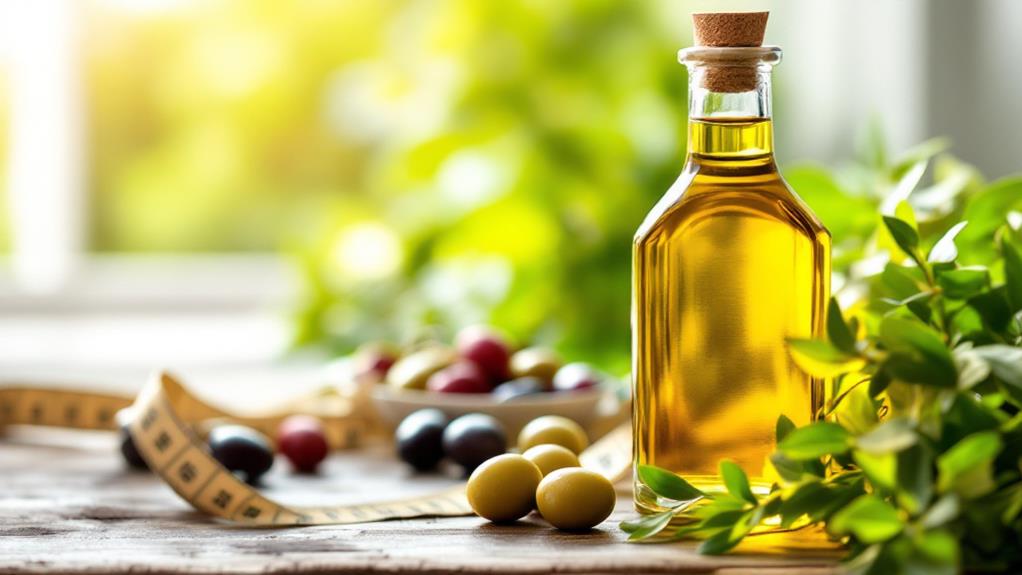
Olive oil is more than a tasty kitchen staple; it's a powerful ally in weight loss. Rich in healthy monounsaturated fats, particularly oleic acid, it improves fat metabolism and elevates calorie burning. Olive oil can also prevent fat storage and reduce cravings by promoting satiety. Its antioxidants and medium-chain triglycerides support metabolic efficiency and enhance insulin sensitivity, aiding in stable blood sugar levels. Enjoy up to four tablespoons of extra virgin olive oil daily, in moderation, to harness these benefits. Uncover how this liquid gold integrates seamlessly into your diet, contributing to effective weight management and general well-being.
Understanding Olive Oil's Nutritional Profile
When you think about olive oil, picture a bottle of liquid gold brimming with health benefits. Extra virgin olive oil (EVOO) is not just a culinary staple; it's a powerhouse of nutrition that can seamlessly fit into your balanced diet. Each tablespoon contains approximately 119 calories and 13.5 grams of fat, mainly derived from healthy monounsaturated fats. These fats are essential for maintaining heart health, with oleic acid at the forefront, known for its ability to improve cardiovascular health and potentially reduce LDL cholesterol levels.
EVOO's nutritional profile is further improved by its rich antioxidant content, including 1.9 mg of vitamin E and 8.1 mcg of vitamin K per tablespoon. These antioxidants are fundamental to providing the health benefits associated with olive oil, supporting general well-being. Moreover, EVOO contains medium-chain triglycerides (MCTs), which are linked to weight management and can contribute to improved metabolic efficiency.
Incorporating extra virgin olive oil into your diet isn't just about adding flavor; it's about embracing a source of nutrition that supports your health goals. With its unique blend of beneficial compounds, EVOO plays an essential role in promoting a healthier lifestyle.
Mechanisms of Weight Loss
Many people are surprised to learn how olive oil can actively contribute to weight loss. Packed with monounsaturated fatty acids (MUFAs) like oleic acid, olive oil improves your body's fat metabolism by activating fat-burning genes. This process is essential for weight loss as it aids in converting stored fats into energy, leading to a reduction in total body fat. By including olive oil in your diet, you also tap into its ability to improve metabolic efficiency and increase calorie burning, thanks to the presence of medium-chain triglycerides (MCTs).
Olive oil isn't just about burning fat; it helps reduce fat storage as well. Its unique compounds may prevent fat formation, particularly in trouble areas like the abdomen and thighs. This makes olive oil a powerful ally in managing your body fat levels. Furthermore, its role as an appetite suppressant means you feel fuller for longer, reducing unnecessary snacking.
Moreover, consuming olive oil improves insulin sensitivity, which is essential for maintaining balanced blood sugar levels and supporting overall weight management. By integrating these healthy fats into your meals, you're not only targeting weight loss but fostering a holistic approach to a healthier lifestyle.
Optimal Daily Consumption
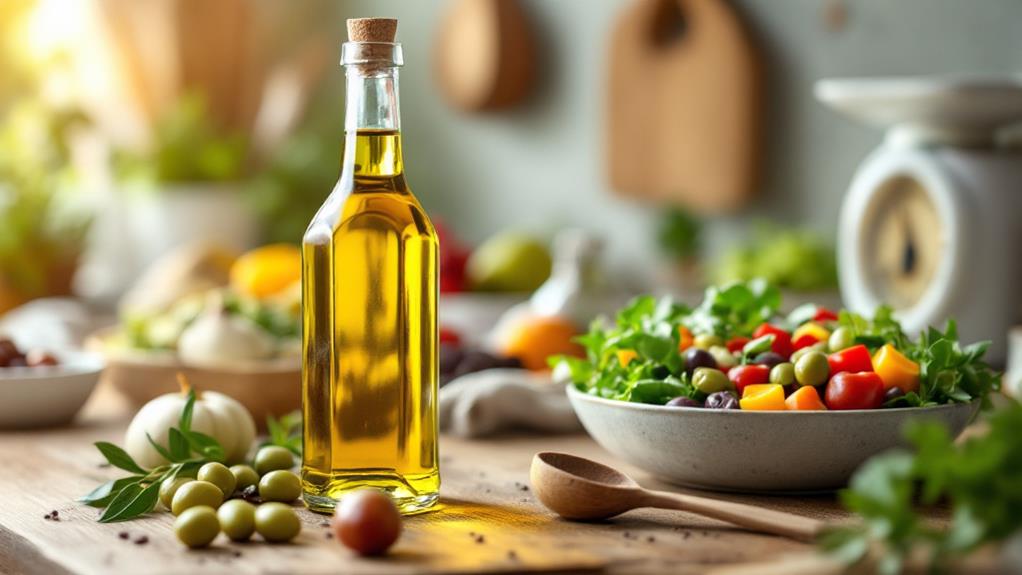
While olive oil plays an important role in facilitating weight loss, understanding how much to consume daily is key to maximizing its benefits. The ideal daily consumption of extra virgin olive oil (EVOO) generally ranges from 2 to 4 tablespoons. This amount helps you enjoy its health benefits without overloading on calories. Remember, moderation is significant since one tablespoon of EVOO contains about 119 calories. Keeping track of your intake guarantees you maintain a balanced diet and effective weight management.
Your dietary needs might differ based on your complete diet, activity level, and health goals. It's wise to tailor your EVOO consumption accordingly. Focusing on high-quality EVOO, especially cold-pressed varieties, is important as they retain more nutrients and beneficial compounds. These healthy fats can be a key part of your diet, supporting weight loss and general wellness.
Incorporating EVOO into a Mediterranean diet, renowned for its health benefits, can further improve the positive effects on weight management. This diet emphasizes whole foods and healthy fats, promoting a holistic approach to nutrition. By balancing EVOO consumption with your lifestyle, you can maximize its advantages.
Creative Ways to Use Olive Oil
Olive oil's versatility extends beyond its health benefits, allowing you to get creative in the kitchen. When you're looking to incorporate olive oil into your meals, start with a simple yet flavorful salad dressing. Mix olive oil with balsamic vinegar, herbs, and spices to enjoy a dish rich in monounsaturated fats that are great for weight loss. This combination not only elevates flavor but also maintains the meal's nutritional value.
For a tasty twist, drizzle olive oil over roasted or steamed vegetables. It adds a delightful taste and beneficial nutrients without piling on extra calories. When sautéing, swap butter or vegetable oil for olive oil. This small change can aid weight management by using healthy fats instead of saturated ones.
Incorporate olive oil into marinades for meats and fish by mixing it with garlic, lemon juice, and herbs. This not only improves the taste but also aligns with a healthy eating plan. Ultimately, add a splash of olive oil to finished dishes like pasta or grains. It improves both the taste and nutritional value, making your meals more satisfying and nutrient-rich, capitalizing on the health benefits of olive oil.
Debunking Olive Oil Myths
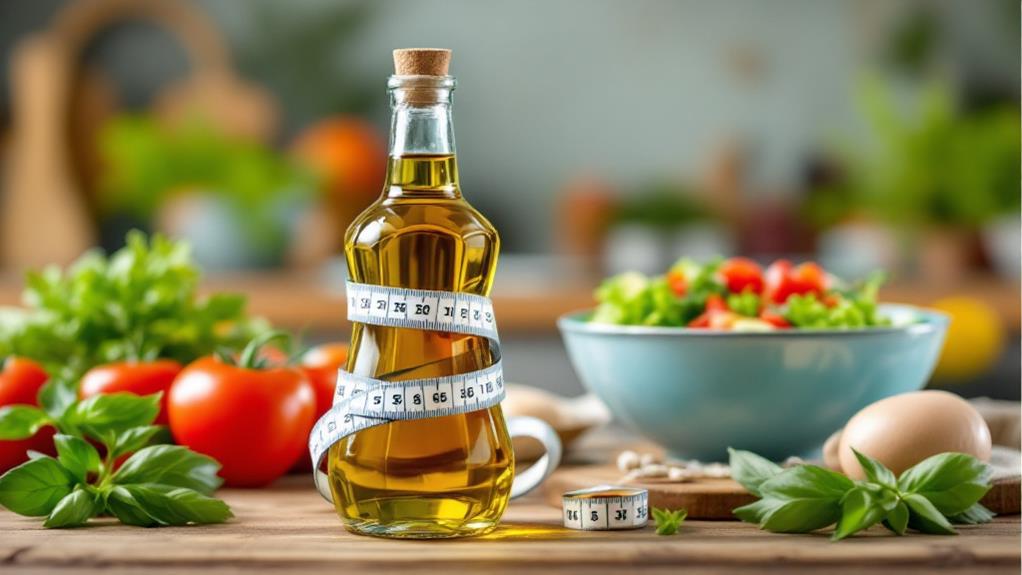
As you investigate the imaginative uses of olive oil in your culinary creations, you might encounter some common misconceptions about its role in weight management. One pervasive myth is that olive oil leads to weight gain due to its high-calorie content. However, olive oil, particularly extra virgin olive oil (EVOO), contains monounsaturated fatty acids that promote satiety and can actually aid in weight loss. These healthy fats help you feel full longer, reducing the comprehensive food intake and curbing unnecessary snacking.
Another myth is that light olive oil is a better option for weight loss. In reality, light olive oil has the same calorie and fat content as EVOO. The term "light" merely refers to its flavor and color, not its nutritional value. For a truly beneficial diet, incorporating EVOO can support your heart health and improve weight management.
Eliminating fats, like olive oil, from your diet can backfire, leading to increased hunger and potential weight gain. Research shows that diets rich in unsaturated fats, such as those in olive oil, result in greater satiety compared to low-fat diets. Welcome these healthy fats for an effective weight loss expedition.

